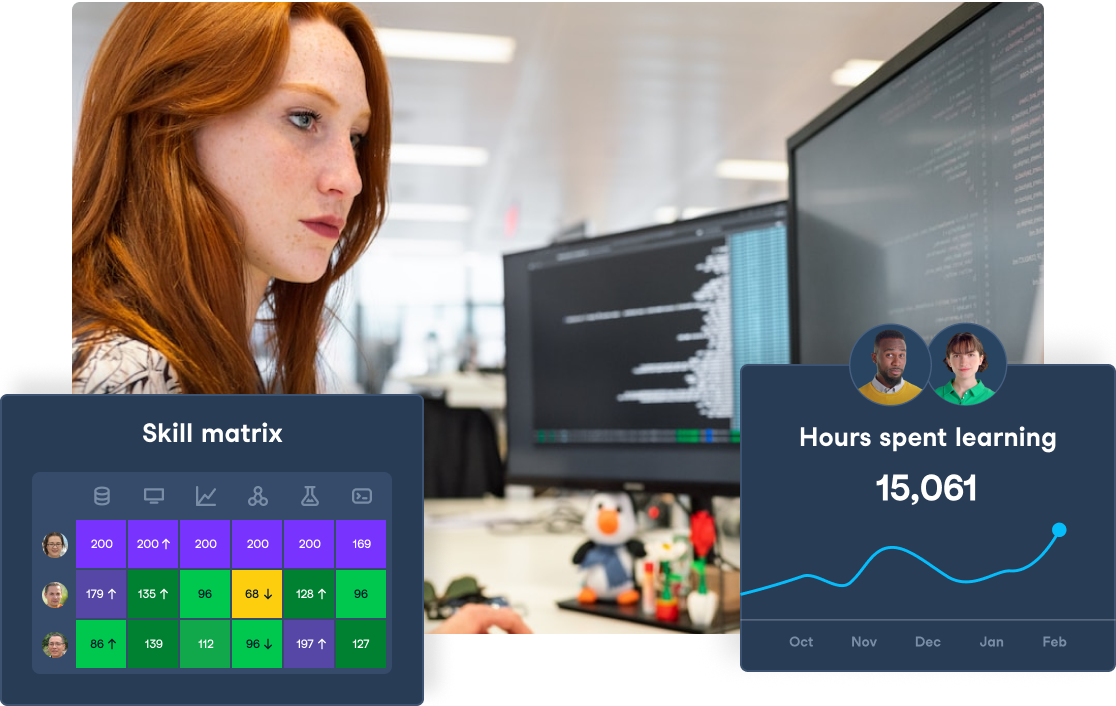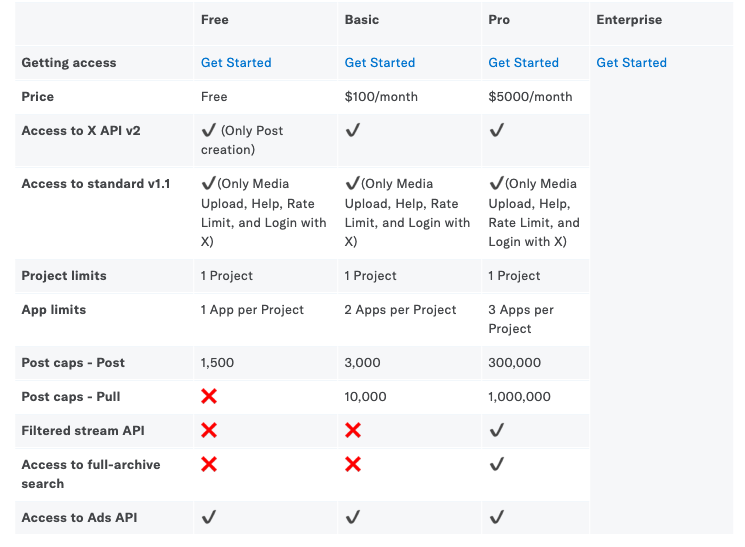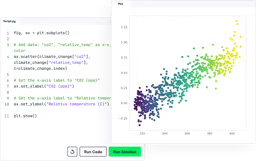Track
As the world's volume of data grows exponentially, it has fast become one of companies' most important assets. Data monetization is the process of using this data to produce economic benefits. It encompasses a range of external and internal strategies that companies can implement to create new revenue streams from data and reduce operational costs.
Building a long-term, comprehensive data monetization strategy is crucial for companies looking to thrive and gain an edge over competitors. Since data is everywhere, companies across industries and sectors should be considering exploring the potential of data monetization to get competitive advantages.
In this article, we explore the concept of data monetization, how it is becoming a must-have strategy for organizations of all kinds, and how you can get started in developing a data monetization strategy for your company.
Curious about how AI can impact your organization? Check out our What Leaders Need to Know About Implementing AI Responsibly webinar.
Empower Your Team with Data Literacy
Enhance your team's data literacy and decision-making capabilities with DataCamp for Business. Access diverse courses, hands-on projects, and centralized insights for teams of 2 or more.

What is Data Monetization?
Data monetization is the process of using company-owned data to create a measurable economic benefit. Data monetization allows companies to increase their scope and flexibility to get the most out of their data.
Depending on the data monetization strategy at hand, we can distinguish between direct and indirect data monetization. The first involves selling data or data-based products to external parties. By contrast, indirect or internal data monetization entails using data to improve business performance.
Data monetization can result in important benefits for companies, including:
- Revenue generation. Either by selling data to third parties or building data-based products, like LLMs, your company can monetize data to create new sources of income.
- Operational efficiency. Data can be used internally to optimize the day-to-day operations of your company. By detecting time-consuming bottlenecks and inefficient processes, and identifying ways to streamline operations, data monetization can help you save costs and increase your performance.
- Enhanced customer experiences. By inserting data analytics in every aspect of your business, you can better understand customer behavior to offer an improved product or service and enhance user experience.
Data Monetization Strategies
There are many ways companies can monetize their data. Depending on the strategy you adopt, we can differentiate between direct and indirect data monetization.
Direct or external data monetization
This involves selling or licensing data to external parties, as well as data-derived products and services. In Data as a Service (DaaS) companies, data can be sold in raw format or aggregated, following a data analysis process.
For example, a company that collects and analyzes market trends could sell data to other businesses. for market research purposes. In more complex cases, companies could sell data embedded in analytics-enabled platforms.
Indirect or internal data monetization
This is a broader concept that entails using data to support operational decision-making and achieve measurable business performance improvements. The possibilities here are endless, from reducing operations costs and streamlining business processes, to better understanding customer behavior and creating new partnerships.
However, most companies with a consolidated data monetization strategy end up with a hybrid approach, a mix of methods that combine internal improvements with external sales. In other words, internal data monetization is often used to improve external data monetization.
Examples of Data Monetization
Let’s analyze how data monetization works in practice with some illustrative case studies.
X (formerly Twitter)
X is a social media company founded in 2006. The platform is ubiquitous via its posts—formerly called tweets—on the Internet and all forms of media. In late 2022, it was acquired by Elon Musk. Soon after his takeover, Musk introduced a series of reforms and management changes in the company, raising concerns about the company's financial ability to maintain its platform.
One of the most drastic moves to find new revenue streams was to cap free access to the Twitter API. The API allows users and developers to relay Twitter data such as user tweets, user profiles, likes, and retweet counts.
With that move, Musk was determined to harness the potential of Twitter’s dataset –arguably one of the most powerful and comprehensive in the world– with an obvious direct data monetization strategy.
Following the new rules, the API provides four tiers of access with different privileges and pricing.

X API access levels. Source: X
While the new changes represent a fair attempt to squeeze margins out of the platform’s developer community, this is only a part of the picture. The impact on the number of developers and X-based applications needs to be assessed in parallel with the potential increase in revenues. Many companies and developers relied on X API’s free access to build all kinds of applications. Following the new rules, many developers, especially small ones,won’t be able to afford the new pricing.
ChatGPT
Generative AI provides new, substantial opportunities to monetize data. Powerful large language models (LLMs) trained with a vast corpus of data can support a wide range of high-value use cases in all kinds of workflows and industries.
Let’s take OpenAI’s ChatGPt, which is probably the most illustrative example of the potential of generative AI. As Vin Vashishta, founder and Chief Revenue Officer of V Squared, puts it in our DataFramed podcast:
Why is ChatGPT such a valuable tool that’s used by so many different types of people? It can support a massive range of workflows. The model can be repeatedly monetized. Why? It was trained on data that covers a massive range of workflows. All that information, or domain knowledge, is locked inside that data until we use a model architecture like ChatGPT.
Vin Vashishta, Founder and Chief Revenue Officer of V Squared
Models based on high-value data can be monetized many times. What makes the difference is not the model, not the code (especially now that open-source LLMs are everywhere), but the data.
Unfortunately, making money out of generative AI is not easy. Gathering high-value data in large quantities (at least, enough to compete with the most accurate models), is difficult and costly. It requires time, talent, and robust technology to collect, store, and process data before feeding the model with it. Further, developing, training, and operating generative AI tools requires considerable resources.
Against this context, it’s not surprising that the generative AI market is highly concentrated in a bunch of Big Tech companies that have the necessary know-how and resources.
Specsavers
Specsavers, a leading provider of optometry, audiology and other healthcare services, faced critical challenges in their data analytics processes. Heavy reliance on manual Excel work and significant skill gaps in Power BI and Databricks hindered employee efficiency and prevented them from fully leveraging data-driven decision-making at scale.
Specsavers partnered with DataCamp for Business to kickstart its data upskilling program so they could leverage the power of data through an internal data monetization strategy.
The goals of the program included:
- Bridging the Power BI and Databricks skill gaps to automate Excel work and offload central analytics teams.
- Increasing data literacy among leadership and employees outside data teams to foster data-driven decision-making.
- Encouraging internal mobility and providing opportunities for employees to start data science careers.
With 115 employees upskilled, Specsavers has seen up to 4 hours of time savings per employee each week, resulting in improved performance and a reduction of costs. Check out the complete case study to know more about the Specsaver-DataCamp partnership.
The story of Specsavers points to one of the most important elements to ensure a successful data monetization strategy. Having a data-literate team in your organization is key to monetizing data.
As Tiffany Perkins-Munn, Head of Data and Analytics for the innovative CDAO organization at J.P. Morgan Chase, points out in DataFramed podcast:
Training is really key so that people understand what they need to do in order to enhance data literacy among the employees.
Tiffany Perkins-Munn, Head of Data and Analytics for the innovative CDAO organization at J.P. Morgan Chase
Data Monetization Challenges and Solutions
Despite its enormous potential, many companies are failing to leverage the power of data to create value for customers, increase revenues and support decision-making processes.
Tiffany Perkins-Munn highlights some of the most common challenges faced by companies:
Businesses struggle to monetize data due to several factors, including technical factors, organizational factors, strategic challenges, as well as the lack of a holistic approach that involves addressing technical issues, building a data-driven culture, investing in talent, ensuring compliance with regulations, developing clear strategies for monetization.
Tiffany Perkins-Munn, Head of Data and Analytics for the innovative CDAO organization at J.P. Morgan Chase
Another important challenge to consider is data privacy. Data monetization means making data more accessible, either internally or externally. Balancing data accessibility with privacy and security can be a significant challenge. In the era of stringent data protection regulations, ensuring the privacy and security of data is paramount. Therefore, while making data accessible, it's crucial to have strong data governance and security measures in place.
Our Introduction to Data Privacy course focuses on providing a solid foundation of privacy principles and relating them with other critical concepts within the interconnected data landscape.
Overall, building a data monetization strategy requires considerable investment in talent and technology and a long-term strategic commitment that many companies lack.
An important lesson for companies is that building a solid data culture is key to success. Data culture refers to an organizational environment where data is not only valued but is also readily accessible and used consistently to drive decision-making processes. It's a culture where data literacy is widespread, and data-driven insights are the norm rather than the exception, as stated by Sudaman Thoppan Mohanchandralal:
Data culture is not just an option, it is mission critical.
Sudaman Thoppan Mohanchandralal, Founder of NautilusPrinciple, and Former Chief Data Officer at Allianz Benelux
If you want to get ready for the data culture revolution in your company, DataCamp can help. DataCamp For Business is a solution especially designed to meet the needs of companies willing to get the most out of data.
With DataCamp for Business, you can expect the following:
- An industry-leading learning platform trusted by 80% of Fortune 1000 companies, including Google, Microsoft, Uber, and eBay.
- A world-class data science curriculum designed by industry experts including courses on Python, SQL, R, ChatGPT, Power BI, Tableau, and Data Literacy.
- Flexible learning tracks that can be customized to the needs of your organization.
- Interactive learning environment with hands-on exercises and real-world use cases.
- Bite-sized lessons for effective knowledge retention.
- Precise learning assessments that allow you to pinpoint and track your company’s strengths and skill gaps at scale.
- Access to industry-recognized data certifications to bridge the gap from education to work.
- Seamless integration capabilities with leading SSO and LMS providers
- Customer success assistance to provide resources and guidance on everything from adoption best practices to SSO and LMS integrations
Get started with DataCamp for Business
Build a data-driven workforce with DataCamp for business

The Future of Data Monetization
Data monetization is rapidly evolving. New technologies are constantly popping up in the data & AI landscape, providing novel possibilities for companies to improve their data monetization strategies, whether direct or indirect. In this context, AI and machine learning remain the most promising technologies to advance optimized predictive tools.
Another important trend is generative AI. Following the rise of tools like ChatGTP and Google Gemini, new ways to create revenue streams open up. Generative AI is a nascent technology. Hence, it’s time for companies to be innovative.
However, as already mentioned, building powerful AI models is costly, and businesses should only make the transition once they have a clear strategy on how to implement this technology. If you want to know more about how to monetize AI, check out our course Monetizing Artificial Intelligence.
These are powerful tools that require data-literate teams to use them. As a result, investing in data culture is more important than ever for companies willing to harness the potential of data and AI.
Conclusion
We hope you enjoyed this article. Implementing data monetization strategies is key for companies to find new streams of income and thrive in the super competitive data & AI business landscape.
Data literacy is a fundamental component of successful data monetization. Building this in your organization will lead to better outcomes for your business and your customers and will empower employees to drive more value in their daily responsibilities.
Contact DataCamp today to get a demo and discover why 80% of the Fortune 1000 choose DataCamp.
Data Monetization FAQs
Why is data monetization important in today’s business landscape?
Implementing data monetization strategies is key for companies to find new revenue streams and thrive in the super competitive data & AI business landscape.
What are the main types of data monetization strategies?
Direct data monetization involves selling or licensing data to external parties, as well as data-derived products and services.
Indirect data monetization is a broader concept that entails using data to support operational decision-making and achieve measurable business performance improvements.
What are the main challenges to implementing a successful data monetization strategy
Businesses struggle to monetize data due to several factors, including technical factors, organizational factors, strategic challenges, as well as the lack of a holistic approach that involves addressing technical issues, building a data-driven culture, investing in talent, ensuring compliance with regulations, developing clear strategies for monetization.
What is the role of data literacy in advancing effective data monetization strategies?
Successful data monetization requires a long-term commitment to building data literacy in your company. Having data-fluent employees is key to harnessing the power of data and AI.

I am a freelance data analyst, collaborating with companies and organisations worldwide in data science projects. I am also a data science instructor with 2+ experience. I regularly write data-science-related articles in English and Spanish, some of which have been published on established websites such as DataCamp, Towards Data Science and Analytics Vidhya As a data scientist with a background in political science and law, my goal is to work at the interplay of public policy, law and technology, leveraging the power of ideas to advance innovative solutions and narratives that can help us address urgent challenges, namely the climate crisis. I consider myself a self-taught person, a constant learner, and a firm supporter of multidisciplinary. It is never too late to learn new things.

